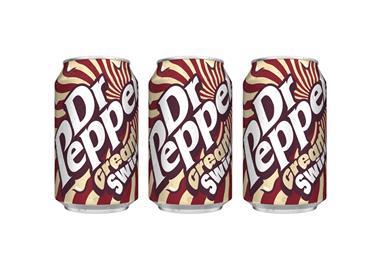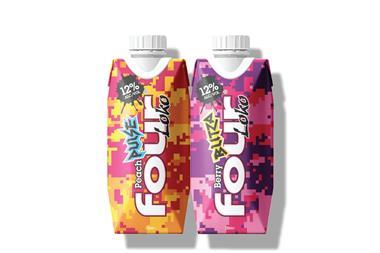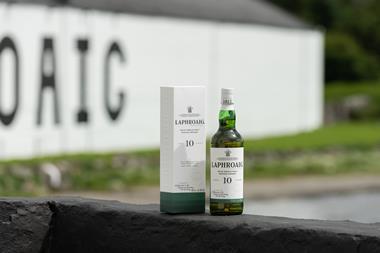In canned fruit, for example, both Asda and Tesco have seen 12% and 9% falls respectively in their year on year sales figures for own label canned fruit, despite continuous low retail prices on the value ranges.
Del Monte, with an 18% share of the canned fruit market, has a 4% greater share than nearest rival Sainsbury. While aggregated own label share will always outweigh private label, the brands still wield real power.
Much of this is harnessed by the multiples to gain footfall, but consumers often have their own agenda for canned foods, according to Heinz European director for canned foods Robin Walker.
He says: "However much other food sectors grow, canned food is going to remain pretty much the core of consumers' consumption habits for the foreseeable future.
"One of the core arguments we put in support of canned or heat-preserved foods is that it's actually a mechanism for providing food that the consumer can trust.
"We find, particularly when a nasty food scare has just taken place, that there is a movement of consumers back to what they know and trust."
Certainly, in brand image terms Heinz has the highest trust rating of any brand, according to Henley Centre figures. "I think we may even have come ahead of the retailers," says Walker.
"Ultimately, the consumer's real reason for shopping with the retailer is the long-term package, whether they want range, choice or lack of frills."
Own label commands high volumes, despite or because of the high profile brand activity. In Budgens, own label makes up 21.4% of canned food sales and is handled by a team of two buyers under a senior buyer. One buyer looks after fish and meat, the other soups, desserts, vegetables and fruit.
As with many other staple purchases, multiples are still using price as the main promotional vehicle, dressed up as buy one, get one free; special offer larger pack sizes; or multiple buy bundles.
Despite these temptations, there is a move towards fresh foods. Budgens' senior buyer Alan Clark sees a decline in volumes as inevitable: "Customers are still buying canned foods to some extent, but there is clearly a move towards buying more fresh products."
Does this mean that more consumers are just walking past the fixture or does it have some unrealised potential? Clark takes the latter view: "Given the escalating consumer consumption of organically grown foods, it's surprising that so few of the big brands have moved into this area."
Even with more than a fifth of the business in own label, the role of the brands still has the job of driving the category. "I would like to see the major brands investing more in development and innovation in the canned sector. Again, I would mention organically grown products.
"The industry has to move with the times and come up with more products that appeal to current consumer tastes and products that match as closely as possible their fresh counterparts."
New ideas to have caught Clark's imagination include Tyne's foil-wrapped lines and soups in foil containers, which he describes as "an excellent idea. It will be interesting to watch their performance."
Performance is also judged by quality, however. Rea Valley Speciality sales and marketing manager Martin Burdekin says: "The type of consumer purchasing our products regards quality as the main purchase motive. Our market has many traditional consumers. There still remain gaps in the market for traditional quality canned meat items. Recent listings under proprietary and own brands have increased incremental sales, demonstrating the potential that this market has yet to achieve."
Seasoned industry leaders recognise that the canned goods fixture has faded in recent years. "We are experiencing a distinct overall market decline in certain categories, including canned fruit," says MacEwen Falconer md Graeme Sloan.
"This gradual demise will continue unless there is a major effort to change consumers' perceptions of canned food."
For Sloan, a wider choice of products would help dispel the poor image dogging some categories.
There are no easy answers, however. "The industry is experiencing extreme difficulty in reinventing itself, with many items attracting a commercial tag and being exploited accordingly. The resulting low levels of profit margin hinder new product development, making it virtually impossible to be progressive."
But Sloan does see a glimmer of hope in generic advertising and more added value products.
"We are investigating the former and developing new products incorporating the latter. Our lifestyles are changing dramatically, as are our eating habits, but within this new culture there are many exciting opportunities for canned food."
Yvonne Adam, marketing manager of HL Foods, agrees the market is a hard one to crack. "Brands and manufacturers have to work twice as hard in attracting and keeping consumers. The key is understanding their needs and finding innovative ways of satisfying their changing requirements."
Formerly focused on foodservice, Westler Foods saw a gap in the canned goods fixture for original products. Retail marketing manager Sue Penson says: "No one was innovating within the canned hot meals market. We were prepared to make an investment in research and development and we felt we had something to offer. It was clear that larger manufacturers seemed inflexible, which has left a gap for the innovators."
These developments include the Vegetable Meals lines and a range of children's products. Vegetable Meals including chilli no carne, vegetarian sausage casserole and a balti vegetable curry have been supported in women's titles. And the Chesswood canned mushroom relaunch is about to get its second wind from advertising in the women's and regional press.
But the role of brand owners is also changing since many of them also have a tradition of importing for private label and tertiary brands. Princes Foods is a good example of the new breed of category manager and partner to the UK grocery trade.
The strength of its Princes brand, its differentiated secondary brands, together with the company's supply management credentials, give it a strong position.
The Princes brand is available across most canned food categories, with particular strengths in fish and meat. The Mitsubishi subsidiary manages a broad portfolio in each sector, giving it considerable buying power.
In the canned fish market, Princes claims to have a dominant supply position across the category. Within tuna specifically, Princes is responsible for supplying more than a third of the UK's retail requirements.
This does not mean that it is going unchallenged. Heinz, which has invested heavily in tuna packing around the world, is strengthening its grip on whole swathes of the market. "We're in tuna for the long game," warns Walker.
{{FOCUS SPECIALS }}
Close menu
- Home
- Retail & Wholesale
-
Products & Suppliers
- Back to parent navigation item
- Products & Suppliers
-
Product Categories:
- Back to parent navigation item
- Product Categories:
- Alcoholic drinks
- Bakery
- Cereals & breakfast
- Cheese
- Chicken & poultry
- Chocolate
- Confectionery
- Crisps, nuts & snacks
- Dairy
- Fish
- Fresh produce
- Frozen
- Household
- Meat
- Own Label
- Sauces & condiments
- Seasonal
- Soft drinks
- Vaping
- Vegan & plant-based
- World foods
- Suppliers
- People
- Reports & Data
-
Topics A-Z
- Back to parent navigation item
- Topics A-Z
-
Popular topics:
- Back to parent navigation item
- Popular topics:
- Cost of living crisis
- Crime
- Deposit Return Schemes
- Finance
- Government & Regulation
- Health
- Inflation
- Loyalty
- Marketing
- Mergers & Acquisitions
- New Product Development
- Sourcing
- Supply chain
- Sustainability & environment
- Technology
- Ultra Processed Foods
- Vaping
- A-Z all topics
- Content by type:
- Events
- Ask iA (beta)
- Subscribe now
Sign in to comment on this article
Not logged in before? Register for FREE guest access today.
You will be able to:
- Read more stories
- Receive daily newsletters
- Comment on stories
Advert


















No comments yet